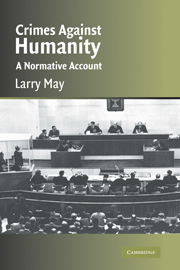3 - Custom, Opinio Juris, and Consent
Published online by Cambridge University Press: 23 November 2009
Summary
It is often said that many universal norms at the international level derive their authority from custom. One of the leading textbooks on international criminal law asserts:
Unlike international agreement as such, customary international law is of a universally obligatory nature. Thus, what was at one time an international agreement binding merely signatories and their nationals can later become customary law for the entire international community.
Jus cogens norms are here said to be non-consensual, and yet sometimes to be also customary. But customary international norms are said to begin life as simply a matter of agreement – that is, arising from the acceptance of States over time.
Initially, it might seem that consensual norms of international law are a nice fit with my moral minimalism. Custom does not seem to be based in the questionable metaphysics of the natural law tradition, and custom seems to provide an easy way to limit the extent of binding norms – that is, to only those norms that reach a near-universal acceptance over time. Custom does indeed seem to limit the reach of international norms in a somewhat plausible way, thereby appealing to one aspect of my moral minimalism – namely, the substantive worry that we not overreach in proscribing every rights violation as a violation of international criminal law. But custom, as a source of jus cogens norms in international criminal law, is not consistent with another aspect of my moral minimalism – namely, that we not rely on controversial assumptions.
- Type
- Chapter
- Information
- Crimes against HumanityA Normative Account, pp. 40 - 60Publisher: Cambridge University PressPrint publication year: 2004

